
views
Forming a Connection with Your Kitten

Play with your kitten. Like all young animals and children, kittens are incredibly playful creatures. When you adopt your kitten, pick up a few cat toys on the way home. These can include rubber or wicker balls and feather wands. Sit on the floor with your kitten and play with it for at least 15 minutes, three times a day. Playing with your kitten also mimics the behavior that it would naturally show with its brothers and sisters. Playful behavior helps a kitten develop its motor skills and the predatory behaviors that come naturally to cats.
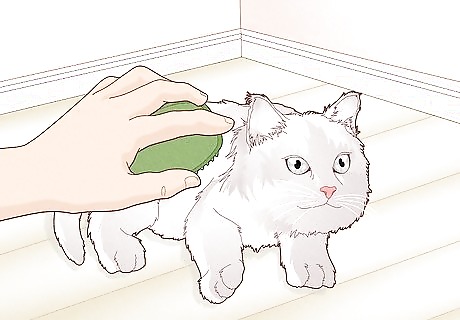
Pet and groom your cat. Young kittens love the attention that grooming gives. Petting and other physical contact will help you feel closer to your kitten, as well. Petting and initiating physical contact with your kitten will mimic the social behavior that cats naturally exhibit, and will show that you have kind, loving intentions towards it. Eventually, when it is comfortable with you and enjoys the pets, your kitten should start purring. If you want to act motherly toward your kitten, rub your head with theirs. Nap with it or find other times to snuggle. Holding it while watching TV, or on the phone are great options.

Blink slowly at it. Blinking is a way that cats naturally show affection to one another, similar to a hug or a kiss among humans. In order to comfort and bond with your kitten, slowly lower your eyelids, blink, and open your eyes again. This should settle your kitten if it’s nervous. If your kitten returns the slow blink, it’s responding to your affection. Do not hold direct eye contact with your kitten—especially shortly after adopting it—as this can be perceived as challenging or threatening behavior.
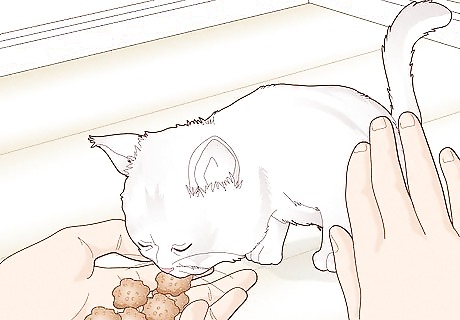
Feed your kitten and give it treats. Animals trust those who help them survive, and tend to be more trusting of those who feed them. While your cat is eating, reach down and pet its back and tail (avoid touching its face while it eats). This will help your kitten associate you with food, and with the pleasant sensation of eating and being petted. When you first bring a kitten home, it may take time to adjust to you and to the new environment. If this is the case, give the kitten space and do not stroke it as it eats.
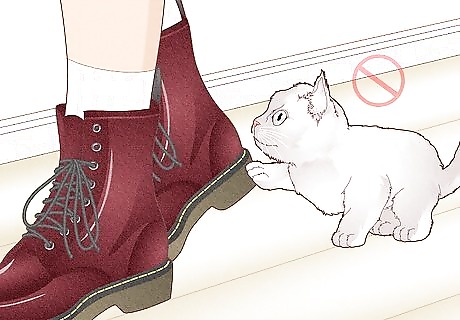
Always put the kitten’s needs first. Kittens are a large responsibility, and can require a surprising amount of attention and maintenance. You’ll need to constantly keep an eye on your kitten while it’s underfoot, and make sure it’s not getting into mischief behind your back. Make sure your kitten has plenty of food and water at all times. You may need to “kitten-proof” areas of your house. Kittens can be destructive. Hide any breakable items (valuable dishes, vases, etc.) and put up any blankets that you wouldn’t want claw-holes in.
Bringing a New Kitten Home
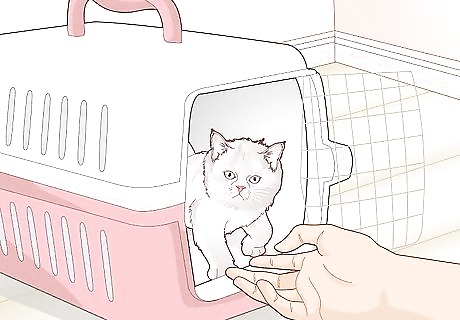
Adopt your kitten while it’s young. Young cats develop quickly, and can readily create emotional bonds while they are between 2 and 12 weeks old. If you’re in communication with the cat breeder, cat foster home, or animal shelter, specify that you’d like a cat within this age range. Many shelters will not adopt cats as young as 2 weeks (the cats will still need their mothers), but you should be able to adopt your kitten well before it’s 12 weeks old. Ideally, look for a kitten around 8 weeks old. The kitten will be independent enough to not need its mother anymore, and ready to bond and play with a new owner.

Decide on its name. Naming an animal will help you feel more personally connected to it. Names indicate possession, closeness, and connection, and can help give your new kitten a sense of personality. When considering names for your kitten, think of: The name of a favorite pet from childhood. The name of a popular character from a beloved book or film.
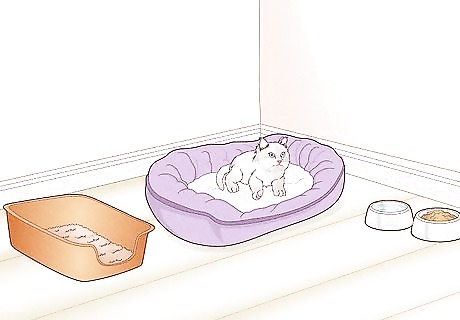
Create a comfortable, safe space for the kitten. During the first several days after you adopt your kitten, keep it in a single room in your house, so it does not become overwhelmed by its new environment. This room should contain the kitten’s bed, food, water, and litter box, as well as a few toys for the kitten to play with. Try to create a place in the house where you and your kitten can relax. For example, you can lay some blankets and pillows down on the floor. When kittens are born the mother usually sleeps next to her newborns. If you do the same the kitten will see you as a motherly figure and find trust in you.
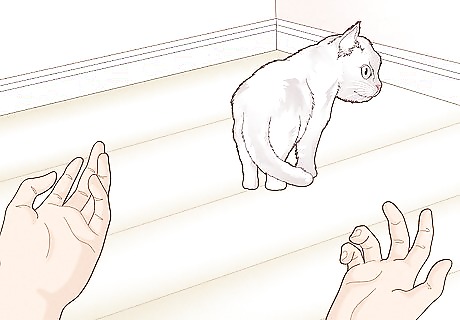
Watch your kitten’s body language. Kittens have unique personalities, and will respond to different stimuli in different manners. Some kittens may be shy, and will quickly become scared if you play too aggressively or start introducing the kitten to too many people or objects at once. If your kitten acts fearful or nervous, give it some space and stop interacting. Nervous behaviors include: Moving away from you. Twitching or tensing its muscles. Acting hyper-alert and reacting to stimuli with fear.
Bonding Around Other Pets and People

Wait to introduce your kitten to other animals. Introducing a kitten to another cat or a dog when you first adopt it can be a traumatizing incident for the kitten, since it will already be nervous and in an unfamiliar environment. Let the kitten get used to your living space before you introduce other pets. You can begin to introduce your kitten to other animals when it’s between 3 and 7 weeks, as long as the kitten is comfortable in its environment. When you bring the kitten and another pet into the same room, give them time to sniff each other. If one or both animals are skittish, try giving them each a bowl of food or a couple treats. This will calm the animals down, and help the older pet develop positive associations with the new kitten.
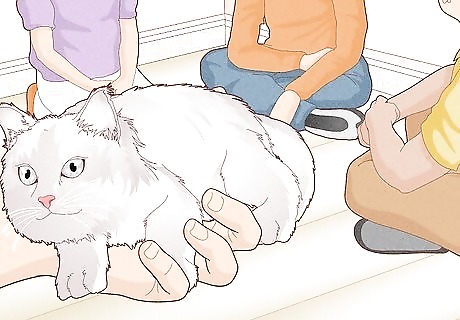
Limit your kitten’s interactions with other people. Make sure that all human interactions with your kitten are positive, gentle, and kind, especially while your kitten is still very young. Especially before 12 weeks of age, kittens are very fragile. If the kitten is around children or other individuals who may treat it carelessly, it could be dropped and injured. It’s fine for your kitten to meet other people, but if you want your kitten to bond most closely with you, you should be the one to play with the kitten, feed it, and care for it the most.
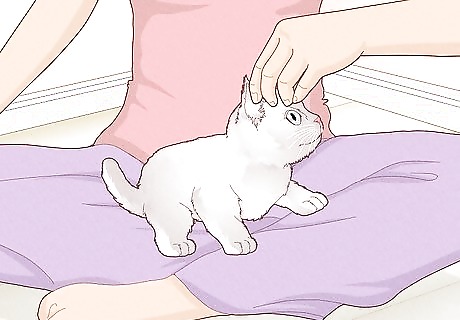
Encourage positive social behavior. Kittens are naturally social animals, and will mimic the behavior that they see you and other humans modeling for them. Encourage friends and family to treat your kitten gently and play with it, to help it develop an emotional bond and find a healthy outlet for its natural predatory instincts. If you kitten is being overly aggressive in its play, walk away and only resume playing when the kitten has calmed down. Do not encourage your kitten to playfully bite or scratch you. Although the behavior may initially seem cute, once the kitten has grown into an adult cat, its bite can be quite painful.










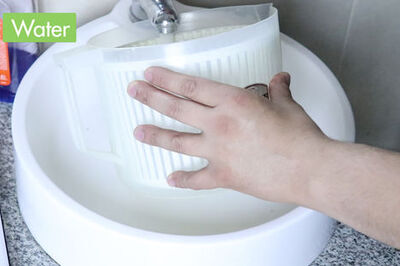






Comments
0 comment